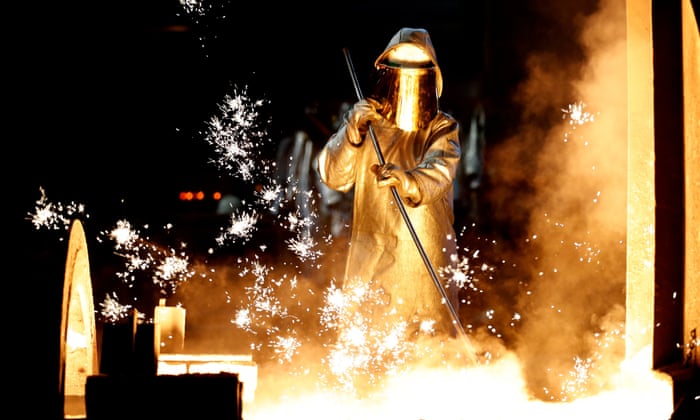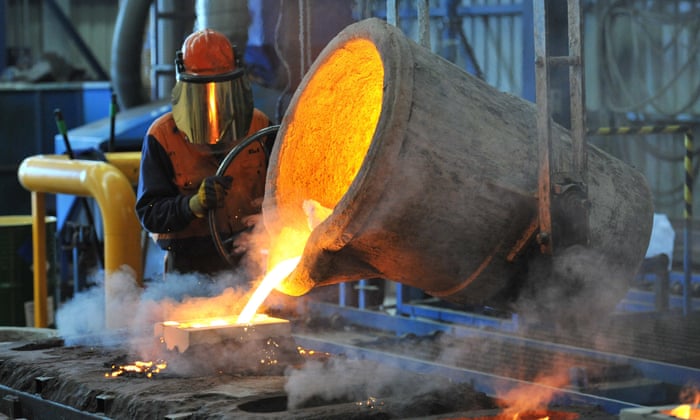Preserving the Peace by Preparing for War
"China's perverse form of capitalism combines illegal mercantilist and protectionist weapons to pick off American industries, job by job."
"China's emboldened military is racing toward head-on confrontation with the U.S."
Peter Navarro, U.S. chief trade adviser
 |
| A worker takes a sample from a blast furnace at the German steelmaker ThyssenKrupp. Photograph: Friedemann Vogel/EPA |
In his book, Death by China, published in 2011 while a professor of economics and public policy at University of California, Peter Navarro impressed many people with his warning and his reasoning about a surging China, undertaking primacy in all vital metals production worldwide, from rare earth metals used in discrete purpose for everything from cancer treatment drugs, to cameras, to magnets and lasers and steel production, shutting other nations' industries out of production in competition with Chinese efficiency in low wages, leaving China the influencer in t he field.
This man's reputation and his theories led to President Trump bringing him in to his administration as a signal and purposeful trade negotiator at a time when the Trump administration is upending all trade negotiations it has with other nations with the charge that they all disadvantage the United States as they currently stand. Which brought Mr. Trump to the point where he decided that steep tariffs would apply to steel imports on the grounds of national security.
Panic ensued in Europe and in Canada, suppliers of steel and aluminum to the U.S. defence industry. Neither of which initially looked a little deeper than the surface when trump tweeted: "Our steel industry is in bad shape. IF YOU DON'T HAVE STEEL, YOU DON'T HAVE A COUNTRY"! A bizarre sentiment on the surface, but a reflection of the American experience during wartime when U.S. steel production was totally geared to the wartime economy and the dominating U.S. steel production was critical to the war effort.
With the advent of the current reality where China is now dominant in steel production, the U.S. would be dependent on China for the source of its steel when, conceivably, it could be at war with China at some future date. Now Trump's message makes eminently explicable sense. American steel production capacity is in the doldrums and realistically it cannot be so fully dependent on other countries for such a vital element.
And as the U.S. Commerce Department points out, the U.S. is at risk of finding itself "in a position where it is unable to be certain it could meet demands for national defence and critical industries in a national emergency". The department gives warning that should the U.S. remain dependent on foreign sources for steel the legal authority to commandeer supplies as needed would be absent, unlike the situation that would pertain in monopolizing steel produced within the U.S.
China is recognized as a colossus in production of steel. And it is also a growing threat to the preeminence of the United States on the world stage. Peter Navarro's 2006 book, The Coming China Wars describe China as a ruthless emerging power whose momentum could conceivably result in its ambitions of dominance succeeding; a country not averse to using the threat of physical power to surmount any threats to its hegemonic influence and perceived entitlements.
The U.S. trade initiative seeks to neutralize its own alarm over America's lack of preparedness should it be required to confront China. A China whose government subsidies enabled the acquisition of steel production over a global market leaving China accounting for half of the world's entire steel production. The need to counter those steel subsidies in particular from China to enable the survival of what is left of the U.S. steel industry calls out for those tariffs alarming the world market.
 |
| US tariffs of 25% on steel imports and 10% on aluminum could lead to a global trade war. Photograph: Julian Smith/EPA |
Labels: China, Conflict, Economy, Monopoly, Production, Trade, United States
0 Comments:
Post a Comment
<< Home